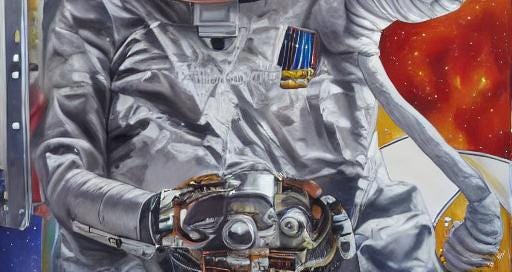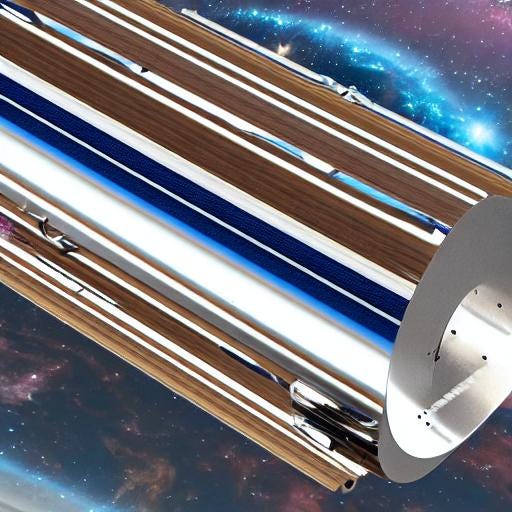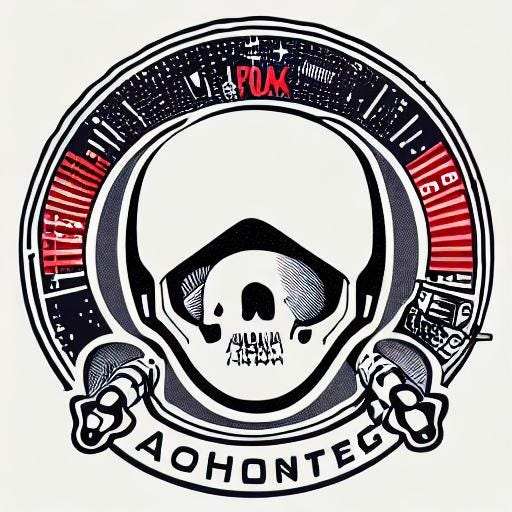Readers unfamiliar with "Hinterlands" may prefer to read these notes only after reading the story.
Valences of cosmic fear
Gibson's short story is about all the ways human fragility, physical and spiritual, must adapt to survive its monetized interactions with a fearsome cosmic anomaly called the Highway. Its effects on individual experiencers (explorers is hardly the word to use) are either death, madness, or suicide.
Toby and Charmian welcome human subjects back from the Highway, salvaging anyone that survives. This hinterland is a desperately hostile frontier, and they cope as best they can to save their own minds.
Gibson's prose is by turns slangy and poignant:
Late that night Charmian brought a special kind of darkness down to my cubicle, individual doses sealed in heavy foil. It was nothing like the darkness of Big Night, that sentient, hunting dark that waits to drag the hitchhikers down to Wards, that dark that incubates the Fear. It was a darkness like the shadows moving in the backseat of your parents’ car, on a rainy night when you’re five years old, warm and secure....
* * *
hinterland. / (ˈhɪntəˌlænd) / noun. land lying behind something, esp a coast or the shore of a river. remote or undeveloped areas of a country.
In his entry about William Gibson in the Science Fiction Encyclopedia, John Clute writes that the author's fiction treats:
[….] traditional sf instruments and themes as unforegrounded interjections into the complex mosaic of urban life; he shifts the grounds of sf displacement inwards from cyber (as it were) to punk; the world his novels describe is old (whereas in agenda or First SF, the future is new) and whether or not the world can be understood, which in Gibson's work is not the case, its inhabitants are consumers, not makers. The essential displacement from which they suffer – like so many protagonists of Postmodernist literature – is the loss of an integrated self, the disintegration of any story of civilization they can descry truly and so defend. For the inhabitants of Gibson's world, selfhood has emptied itself into the instruments of the world, and in book after book – like cases of flesh – his characters are found hacking the wilderness for Cargo….
"Hinterlands" (1980) is a condensed and useful example of Clute's point. It is also a compelling strange-making of cosmic horror tropes.
Written in a period before cosmic horror became an academic and commercial name-brand, "Hinterlands" synthesizes inner-space sf with an authorial voice mixing Raymond Chandler and William S. Burroughs. In doing so, it accomplishes what Lovecraft defined as his fiction sui generis: the literature of cosmic fear.
[….] A certain atmosphere of breathless and unexplainable dread of outer, unknown forces must be present; and there must be a hint, expressed with a seriousness and portentousness becoming its subject, of that most terrible conception of the human brain--a malign and particular suspension or defeat of those fixed laws of Nature which are our only safeguard against the assaults of chaos and the daemons of unplumbed space.
* * *
Narrator Toby Halpert works to nurse back to sanity human astronauts that survive a trip on the Highway, an anomalous, unpredictable gateway "at a fixed point about an eighth of the way out toward the orbit of Mars." Toby is one of many such specialists, first through the airlock to try making a gestalt connection with returning travellers before they are lost to suicide or catatonia.
Toby works on Heaven, the reception component of a larger space station near the anomaly.
[….] Our DOA count runs at twenty percent. Suicide. Seventy percent of the meatshots are automatic candidates for Wards: the diaper cases, mumblers: totally gone. Charmian and I are surrogates for that final ten percent.
If the first ones to come back had only returned with seashells, I doubt that Heaven would be out here. Heaven was built after a dead Frenchman returned with a twelve-centimeter ring of magnetically coded steel locked in his cold hand, black parody of the lucky kid who wins the free ride on the merry-go-round. We may never find out where or how he got it, but that ring was the Rosetta Stone for cancer. So now it’s cargo cult time for the human race. We can pick things up out there that we might not stumble across in research in a thousand years. Charmian says we’re like those poor suckers on their islands, who spend all their time building landing strips to make the big silver birds come back. Charmian says that contact with “superior” civilizations is something you don’t wish on your worst enemy....
* * *
We’re like intelligent houseflies wandering through an international airport; some of us actually manage to blunder onto flights to London or Rio. maybe even survive the trip and make it back. “Hey.” say the other flies, “what’s happening on the other side of that door? What do they know that we don’t?” At the edge of the Highway every human language unravels in your hands—except, perhaps, the language of the shaman, of the cabalist. the language of the mystic intent on mapping hierarchies of demons, angels, saints.
Toby and his colleagues only see a small and ultimately meaningless slice of Highway reality. They are unequipped, but skilled at acquiring the habits of negative capability and equipoise. The drugs help.
Flies in an airport, hitching rides. Flies are advised not to ask too many questions; flies are advised not to try for the Big Picture. Repeated attempts in that direction invariably lead to the slow, relentless flowering of paranoia, your mind projecting huge dark patterns on the walls of night, patterns that have a way of solidifying, becoming madness, becoming religion. Smart flies stick with Black Box theory; Black Box is the sanctioned metaphor, the Highway remaining x in every sane equation. We aren’t supposed to worry about what the Highway is, or who put it there. Instead, we concentrate on what we put into the Box and what we get back out of it. There are things we send down the Highway (a woman named Olga, her ship, so many more who’ve followed) and things that come to us (a madwoman, a seashell, artifacts, fragments of alien technologies). The Black Box theorists assure us that our primary concern is to optimize this exchange. We’re out here to see that our species gets its money’s worth. Still, certain things become increasingly evident; one of them is that we aren’t the only flies who’ve found their way into an airport. We’ve collected artifacts from at least half a dozen wildly divergent cultures. “More hicks,” Charmian calls them. We’re like packrats in the hold of a freighter, trading little pretties with rats from other ports. Dreaming of the bright lights, the big city . . .
* * *
"Hinterlands" narrates one day in Toby's work week. He is called up to Heaven to greet a return from the Highway; if they are alive, he must get to them before they kill themselves. It's a race to connect before the Fear can do its work.
I’d felt it before, the Fear, but only the fringes, the least edge. Now it was vast, the very hollow of night, an emptiness cold and implacable. It was last words, deep space, every long good-bye in the history of our species. It made me cringe, whining. I was shaking, groveling, crying. They lecture us on it, warn us, try to explain it away as a kind of temporary agoraphobia endemic to our work. But we know what it is; surrogates know and handlers can’t. No explanation has ever even come close.
It’s the Fear. It’s the long finger of Big Night, the darkness that feeds the muttering damned to the gentle white maw of Wards. Olga knew it first, St. Olga. She tried to hide us from it, clawing at her radio gear, bloodying her hands to destroy her ship’s broadcast capacity, praying Earth would lose her, let her die . . .
For all the day's topsy-turvy action, Toby arrives too late by a matter of seconds.
[….] It had been business as usual, really. A bad day in Heaven, but it’s never easy. It’s hard when you feel the Fear for the first time, but I’ve always known it was there, waiting.
Toby then tells us how he ended-up with his job. Not every astronaut approaching the Highway anomaly gets sucked out of the human hinterland.
[….] Some people just aren’t taken, and nobody knows why. And you’ll never get a second chance. They say it’s too expensive, but what they really mean, as they eye the bandages on your wrists, is that now you’re too valuable, too much use to them as a potential surrogate. Don’t worry about the suicide attempt. they’ll tell you; happens all the time. Perfectly understandable: feeling of profound rejection. But I’d wanted to go, wanted it so bad. Charmian, too. She tried with pills. But they worked on us. twisted us a little, aligned our drives, planted the bonephones, paired us with handlers.
* * *
"Hinterlands" nicely subverts the dictum that opens "The Call of Cthulhu" (1927):
We live on a placid island of ignorance in the midst of black seas of infinity, and it was not meant that we should voyage far.
Unless, of course, there is real money at stake.
Whether astronauts sucked onto and off of the Highway can be said to travel far, they have clearly gone far enough. Toby and his colleagues participate in an essentially janitorial process. There is no imaginable picture of reality to be made with fragments found on the Highway, or with the Highway itself. It only hints at we-know-not-what, which is sufficiently maddening in itself.
Jay
Notes
"Hinterlands" can be read here.
PseudoPod 486: Hinterlands can be found here.
William Gibson's opinion of H. P. Lovecraft can be read here.






